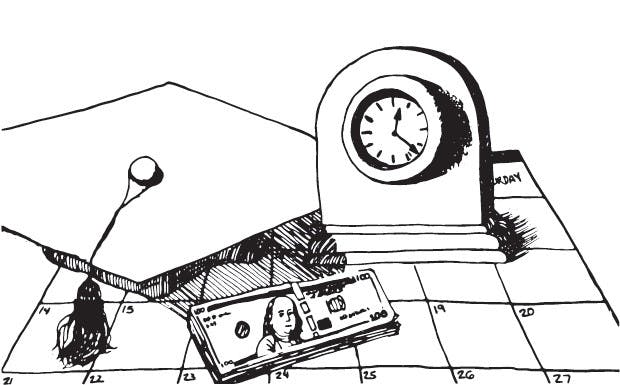Losses attributed to reduction in student residents, state funding
By Connor Benintendi and Kenneth Duncan

Refunds for unused student housing in spring and summer cost the university $11 million, according to University Communications Director Paul Cocke, and state funding is expected to decrease by $13.4 million.
COVID-19 has cost Western nearly $25 million in revenue since the end of winter quarter, and administrators say the university may feel the effects for years.
University Housing and Dining is a major piece in Western’s self-sustaining revenue, or funds generated from various university-ran departments, according to Western’s 2018-19 operating budget. The full 2019-20 operating budget is not yet available, but it is similar to the budget from 2018-19, Cocke said.
As a public university, Western receives roughly half of its $349 million yearly operating budget from the state of Washington, with self-sustaining revenues fueling three areas of the Western budget. These include Dedicated Local Funds, Internal Service Funds and Auxiliary Funds, according to Western’s Budget Office.
The largest piece, Auxiliary Enterprises, makes up $75 million of Western’s self-sustaining funding and consists of University Residence and Dining Services, the Viking Union and Student Activities, Campus Recreation, Athletics, the Associated Students bookstore and parking fees. Of these services, University Residence and Dining Services provides approximately $49 million of Western’s revenue, according to Western Accounting Services 2019 Housing and Dining financial statement.
New projections show that Washington state is estimated to face an $8.8 billion revenue shortfall through 2024, according to an update from Western’s Budget and Financial Planning department on June 26. The $13.4 million that Western expects to lose is a part of the state’s effort to meet the overall goal of reducing higher education spending by 15%.
The Western Board of Trustees approved a 2.5% increase to tuition rates for 2020-21 on June 11, which equates to about $164 per year for in-state students. Residence hall room and board rates will also see a 4% increase.
In an effort to plan for budget reductions coming into the 2020-21 fiscal year, Western has been forced to make staffing changes.
“There has been a reduction in full-time staff as a result of COVID-19, not through layoffs but through hiring freezes,” Cocke said. “When positions become vacant, they need special approval to be refilled.”
Julian Sullivan, a first-year Western student, said that living on-campus during spring quarter came with a severe reduction in University Housing and Dining services and student population resulting from COVID-19.
“They’ve cut the hours of the dining hall down a lot, and there’s also nowhere to spend dining dollars, which is frustrating,” Sullivan said.
Cocke said that the loss in housing revenues is just one of the factors influencing Western’s decision to re-open residence halls for fall quarter. Western is planning for a hybrid approach to classes in the fall, utilizing a mix of both in-person and remote courses.
“Western feels it’s important to offer housing and dining accommodations for students taking in-person classes as well as those who need or want housing for other reasons,” Cocke said. “The Housing and Dining System is eliminating expenditures where possible, but it does have large fixed costs associated with its facilities”
Robert Stein, a Western resident advisor, said that the operation of residential halls is important for students who depend on the university for shelter.
“One of the few things I’ll give [Western] credit for is that they’ve been consistent from the very beginning about saying ‘We're going to remain open,’” Stein said. “There are students who, without university housing, are homeless.”
Cocke said it is currently unknown how much Western’s tuition revenue will be affected by COVID-19. Fall enrollment determines the amount of revenue generated by student tuition, and thus how much Western will lose in net tuition operating fees. Revenue numbers depend on the mix of in-state students whose tuition increase is capped by the state legislature, as well as out-of-state students who pay higher tuition in order to access Washington’s state-funded education system.
Enrollment numbers for fall in comparison to previous years are still unclear, and Cocke said the university will be working with confirmed and admitted students well into August.
“Whether there will be a decrease in tuition revenue depends on final enrollment numbers for fall quarter,” Cocke said. “If a significant number of students opt out of fall quarter, tuition revenues will decrease. This is a consideration in our budget scenario planning.”
By contrast, Western’s summer enrollment saw an increase, according to Cocke.
“Enrollment for summer session at Western is strong,” Cocke said. “As of the first day of summer session, enrollment was up 13.9% compared to summer 2019.”





